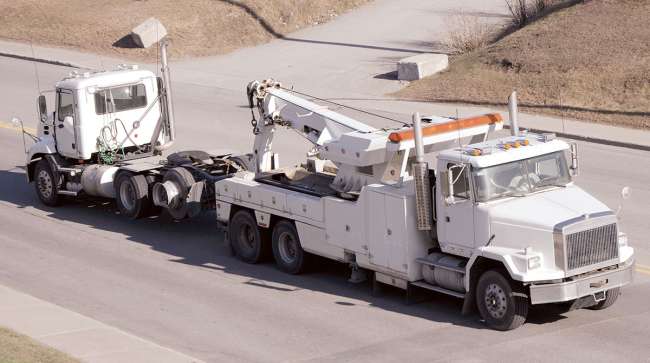Staff Reporter
Ontario Targets Predatory Towing Practices

[Stay on top of transportation news: Get TTNews in your inbox.]
Cracking down on predatory towing, Ontario now requires tow truck drivers and vehicle storage operators to have a certificate to operate in the first such move by a Canadian province.
Effective July 1, Ontario requires tow truck drivers and vehicle storage operators to have a certificate to operate to protect drivers from fraudulent towing companies. Tow driver certificates must be available to present to consumers upon request.
“While the vast majority of Ontario’s towing industry operates in good faith, bad actors have preyed on vulnerable drivers for too long,” said Prabmeet Sarkaria, provincial transportation minister. “That is why our government is helping to level the playing field, giving people confidence and peace of mind when they need help at the side of the road.”
To receive or maintain a towing certificate, tow truck drivers must complete a mandatory training program and a criminal record check. They cannot be certified if they have convictions of certain criminal offenses, found to be lacking mandatory automobile insurance or have violations of highway laws and drug/substance crimes.

Sarkaria
Drivers who tow vehicles without a certificate face fines, possible vehicle impoundment and possible future forfeiting of a towing certification.
Ontario government officials have been taking measures to protect consumers from unscrupulous towing companies and drivers. Among the new protections, consumers are able to choose a towing company to transport their vehicles and request a driver’s proof of certificate unless directed by police. More than 300,000 people in Ontario have their vehicles towed annually.
There are different certificates for tow operators, tow drivers and vehicle storage operators. The charges for certificates are $195 for three years for tow drivers and $575 annually for tow operators and storage operators.
Under the towing and vehicle storage laws that took effect Jan. 1, tow operators and vehicle storage operators must have a certificate to operate in Ontario that shows the name of the company and certificate number on all their tow trucks and on consumer consent forms and invoices.
Tow truck drivers, towing companies and vehicle storage providers also must abide by a code of conduct.
To receive a tow operator certificate, applicants must have a valid Ontario Commercial Vehicle Operator’s Registration certificate or National Safety Certificate and have neither outstanding fees/fines nor a record of being refused a municipal license. Companies also must have a history of providing competent and safe towing services.
Tow operators and vehicle storage owners must have minimum insurance coverage with $2 million in liability insurance for personal injury or death and loss or damage to property, $100,000 in consumer vehicle insurance and $50,000 in cargo liability insurance. Applicants, too, must have a criminal and business records check and not have any convictions for certain criminal, drug and weapons offenses.
Consumers have rights about providing consent to tow, where vehicles are towed, accessing their vehicles, vehicle storage facilities and rates/payment options. Tow truck drivers must provide information on the maximum fees/rate and take a customer’s vehicle to a desired location on the most direct route.
As of July 1, 2024, Ontario will become the first province in Canada to require tow truck drivers to have a certificate to operate.
This is part of the government’s plan to increase safety, protect customers, and improve standards in the towing industry.https://t.co/q8ptf45qD2 pic.twitter.com/CMHw05sNGL — Ontario Ministry of Transportation (@ONtransport) June 29, 2024
Before towing a vehicle, towers and drivers must provide their rates and consumer rights, obtain customer consent on a tow form (including names of the tow driver and operator, the tow driver’s certificate and their operator certificate numbers). Customers must receive an unchanged consent for copy with all information required by law.
If the tow truck driver/towing company fails to obtain a vehicle owner’s consent, they cannot charge for services. Once consumers give their OK, towers cannot change the agreement.
Towing companies also must post their rates at their office/business, on their website if applicable and vehicle storage locations. After receiving a towed vehicle, storage operators must inform vehicle owners where the vehicle is being held, how to get it back and a contact person.
Jeff Loftus of FMCSA joins TT’s Seth Clevenger to discuss the current outlook on ADAS technology and how it will affect the industry at large. Tune in above or by going to RoadSigns.ttnews.com.
When paying for a tow, customers are entitled to see an itemized invoice before paying, can select a payment method and obtain a receipt. Tow truck operators’ certificate status, along with rates, can be verified on the transportation ministry’s online portal.
In most cases, if a storage lot operator fails to notify vehicle owners within 15 days after receiving a vehicle, the company’s charge is limited to the cost of towing and storing a vehicle for that period.
Unless prohibited by police, storage lot operators must allow vehicle owners/authorized to retrieve at no cost personal belongings from vehicles during regular operating hours or provide access when a lot is open for business.
It is against the law for towers to offer services under a different business name/contact information, refer customers to a business, facility, person or entity they have a business interest in or try to sell unrequested services. It also is illegal for towers to provide false, misleading or deceptive statements, information, documents or advertising.
Also, a tower cannot charge vehicle owners more than the company’s maximum rate for a service, fuel surcharges or storage services after owners have made a reasonable attempt to retrieve their vehicles from storage yards. Towers aren’t allowed to refer vehicles owners for legal or health-care services, or use any information beyond what is allowed by law.
Want more news? Listen to today's daily briefing below or go here for more info:





